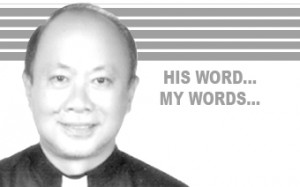 READINGS:Â Â Jeremiah 1: 4-5. 17-19Â Â /Â Â Psalm 71: 1-2. 3-4. 5-6. 15. 17Â Â /Â Â 1 Corinthians 12: 31- 13: 13
READINGS:Â Â Jeremiah 1: 4-5. 17-19Â Â /Â Â Psalm 71: 1-2. 3-4. 5-6. 15. 17Â Â /Â Â 1 Corinthians 12: 31- 13: 13
LUKE 4: 21-30Â
HIS WORD…SURELY YOU WILL QUOTE ME THIS PROVERB, ‘PHYSICIAN, CURE YOURSELF,’ AND SAY, ‘DO HERE IN YOUR NATIVE PLACE THE THINGS THAT WE HAVE HEARD WERE DONE IN CAPERNAUM.’ AMEN, I SAY TO YOU, NO PROPHET IS ACCEPTED IN HIS OWN NATIVE PLACE.
my words…At the end of last Sunday’s gospel and at the beginning of today’s gospel,St. Luke bridges the shortest, nine-worded sermon of Jesus, “Today this Scripture passage is fulfilled inyour hearing†(Lk 4:21) with Jesus’ reaction on the disbelief, mistrust, and insults of His own peoplewhen He said, again in nine words, “No prophet is accepted in his own native place†(Lk 4:24}. In Exegesis, this is one of the artistic styles of St. Luke in presenting the Third Gospel.
Brothers and Sisters, last Sunday, we celebrated the “National Bible Sunday†and consequently the “National Bible Week†that practically culminates today. And in giving much importance to the Bible, we may ask, why has the sermon or homily today become an important constitutive part of the Holy Mass? In the old rite, sermons were obligatory only on Sundays and Solemnities. But today, it has become a constitutive (without which the Mass is not complete) part of the Mass. And here comes the answer to the question: The HOLY MASS is a banquet of Two Tables; the Table of the WORD (the Lectern), and the Table of the BODY (the Altar). In the Table of the Word, the Readings are our food and nourishments and refreshments, and the SERMON is the HOLY COMMUNION OF THE WORD, the meal part, the eating, the chewing, and the digesting of the Word. That is why the Homily has become a heavy responsibility on the part of the preacher to make the congregation savor and be filled with (busognabusog) and be nourished by the Holy Word of God. The preacher’s primary role is to help the people digest the Word of God for their spiritual and total nourishments. In the Table of the Body, the Bread and the Wine, representing the offerings of the people, will be transubstantiated to become the Body and Blood of Jesus Christ and become our food and drink received in the HOLY COMMUNION OF THE BODY. That is why, the Holy Communion is the realization or actualization of the mystery of the incarnation, “And the Word was made flesh, and dwelt among us†(Jn 1:14). In Holy Communion Jesus dwells among us and in us. He nourishes us, He invigorates us, and He heals us in Holy Communion. So, the Sermon in the Liturgy of the Word is equivalent to Holy Communion in the Liturgy of the Body. And that is how important the sermon or homily in the Holy Mass is.
Brothers and Sisters, it is said that, communion completes the Mass; and this communion is the communion of the Word and the communion of the Body. May every Eucharistic celebration be a delightful banquet of the Word and of the Body of Jesus for the strength of our faith and Christian living. May Jesus’ Word and Body nourish us and bring us to eternal life.
HAPPY HOLY COMMUNION OF THE WORD OF GOD AND OF THE BODY OF CHRIST… AMEN. (By Fr. Julius C. Lupot)
